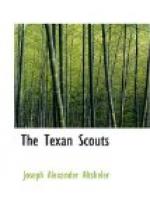It was about two hours before noon when Ned set out across the plain. Usually in this region antelope were to be seen on the horizon, but they were all gone now. The boy considered it a sure sign that Mexican detachments had passed that way. It was altogether likely, too, so he calculated, that the Mexican army was now nearer than he to San Antonio. His flight had taken him to the west while Santa Anna was moving straight toward the Texan outworks. But he believed that by steady riding he could reach San Antonio within twenty-four hours.
The afternoon passed without event. Ned saw neither human beings nor game on the vast prairie. He had hoped that by some chance he might meet with his comrades, but there was no sign of them, and he fell back on his belief that their skill and great courage had saved them. Seeking to dismiss them from his thoughts for the time in order that he might concentrate all his energies on San Antonio, he rode on. The horse had recovered completely from his great efforts of the preceding night, and once more that magnificent piece of machinery worked without a jar. Old Jack moved over the prairie with long, easy strides. It seemed to Ned that he could never grow weary. He patted the sinewy and powerful neck.
“Gallant comrade,” he said, “you have done your duty and more. You, at least, will never fail.”
Twilight came down, but Ned kept on. By and by he saw in the east, and for the third time, that fatal red glow extending far along the dusky horizon. All that he had feared of Santa Anna was true. The dictator was marching fast, whipping his army forward with the fierce energy that was a part of his nature. It was likely, too, that squadrons of his cavalry were much further on. A daring leader like Urrea would certainly be miles ahead of the main army, and it was more than probable that bands of Mexican horsemen were now directly between him and San Antonio.
Ned knew that he would need all his strength and courage to finish his task. So he gave Old Jack a little rest, although he did not seem to need it, and drew once more upon his rations.
When he remounted he was conscious that the air had grown much colder. A chill wind began to cut him across the cheek. Snow, rain and wind have played a great part in the fate of armies, and they had much to do with the struggle between Texas and Mexico in that fateful February. Ned’s experience told him that another Norther was about to begin, and he was glad of it. One horseman could make much greater progress through it than an army.
The wind rose fast and then came hail and snow on its edge. The red glow in the east disappeared. But Ned knew that it was still there. The Norther had merely drawn an icy veil between. He shivered, and the horse under him shivered, too. Once more he wrapped around his body the grateful folds of the serape and he drew on a pair of buckskin gloves, a part of his winter equipment.




